人教版(2019)选择性必修 第三册Unit 5 Poems Learning About Language 课件(共43张ppt)
文档属性
| 名称 | 人教版(2019)选择性必修 第三册Unit 5 Poems Learning About Language 课件(共43张ppt) | 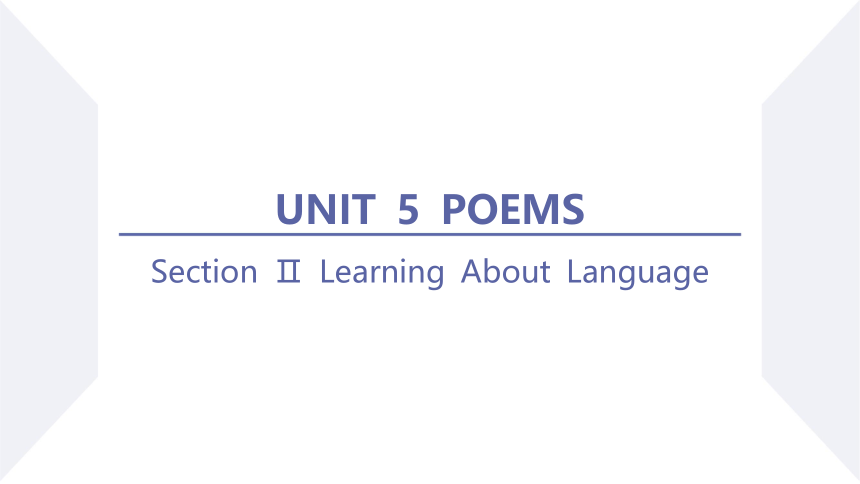 | |
| 格式 | pptx | ||
| 文件大小 | 316.2KB | ||
| 资源类型 | 教案 | ||
| 版本资源 | 人教版(2019) | ||
| 科目 | 英语 | ||
| 更新时间 | 2024-04-07 17:02:27 | ||
图片预览

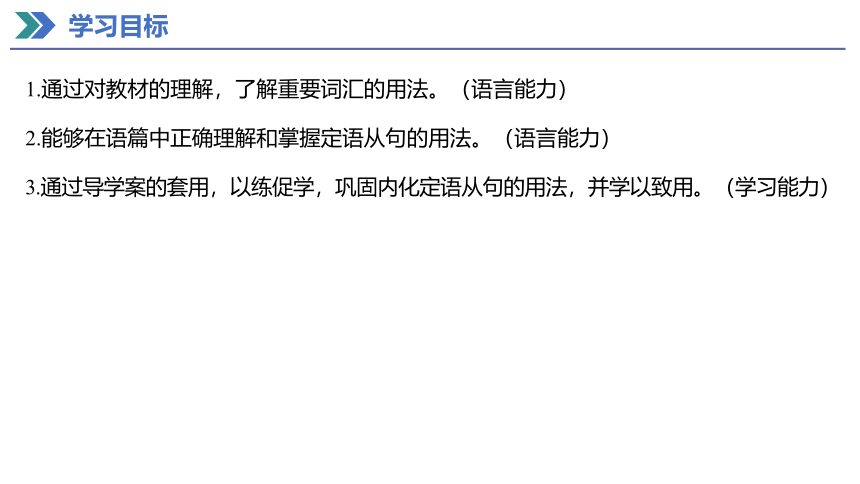
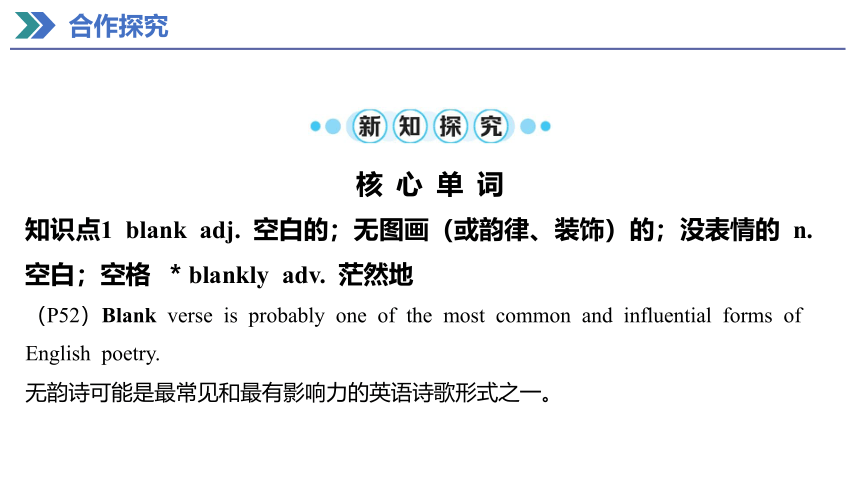
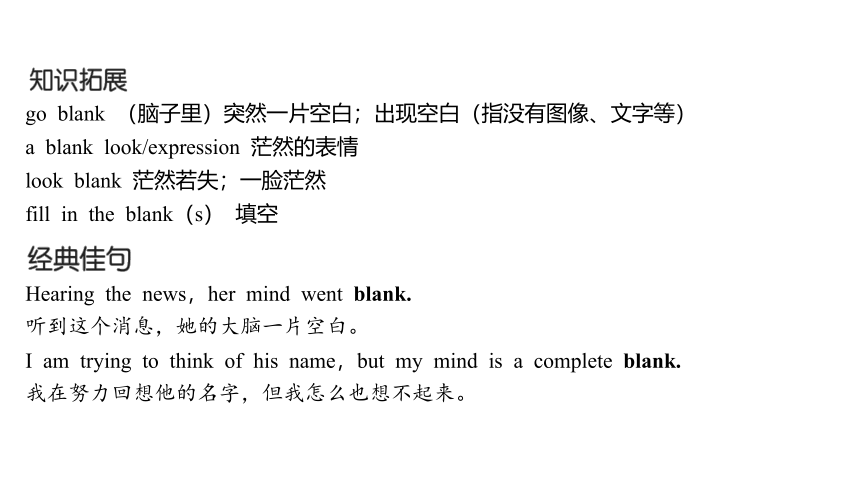
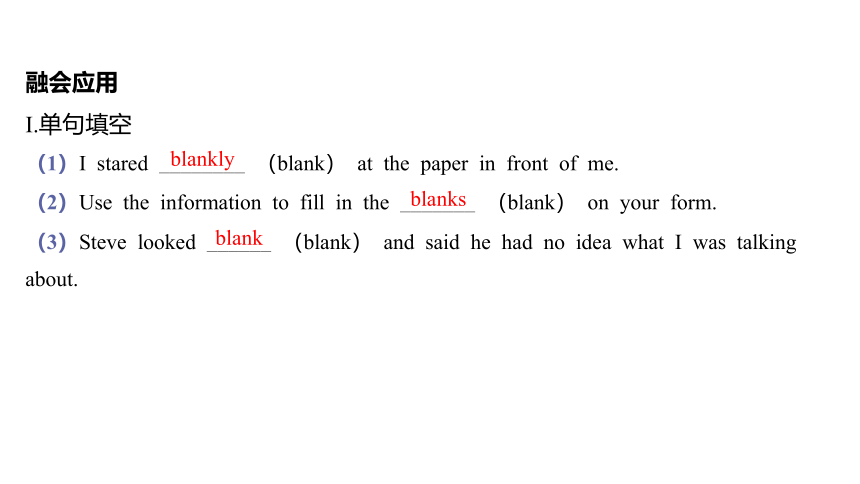
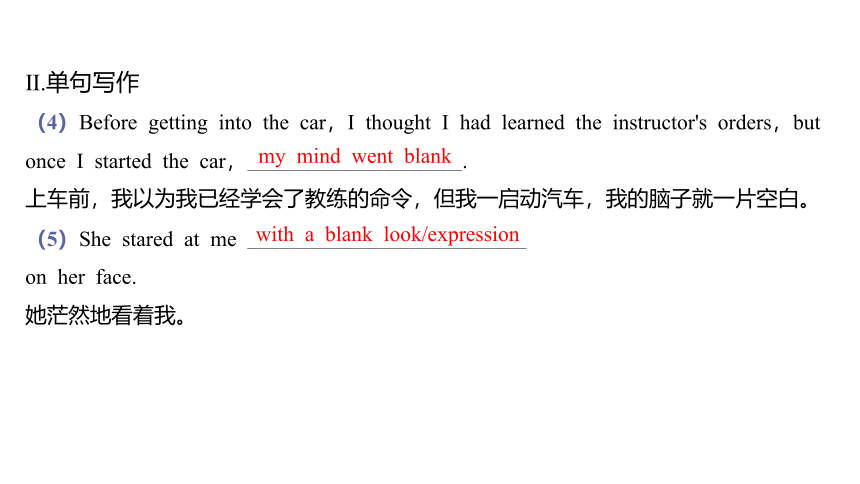
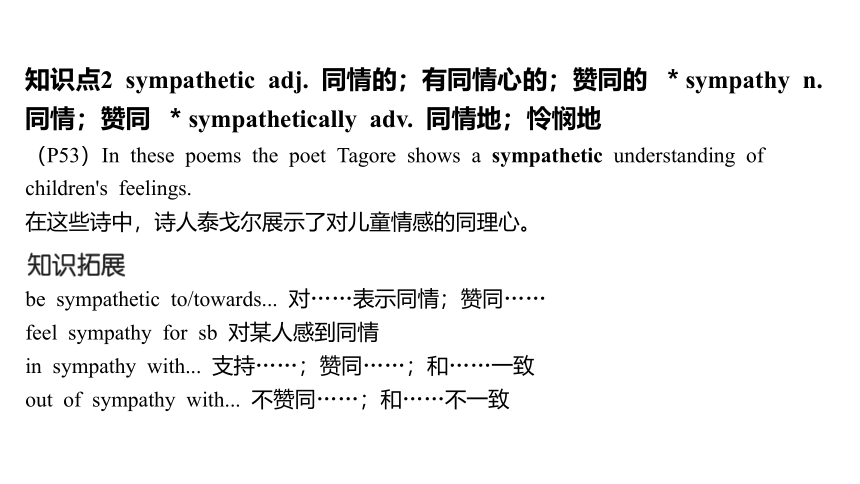
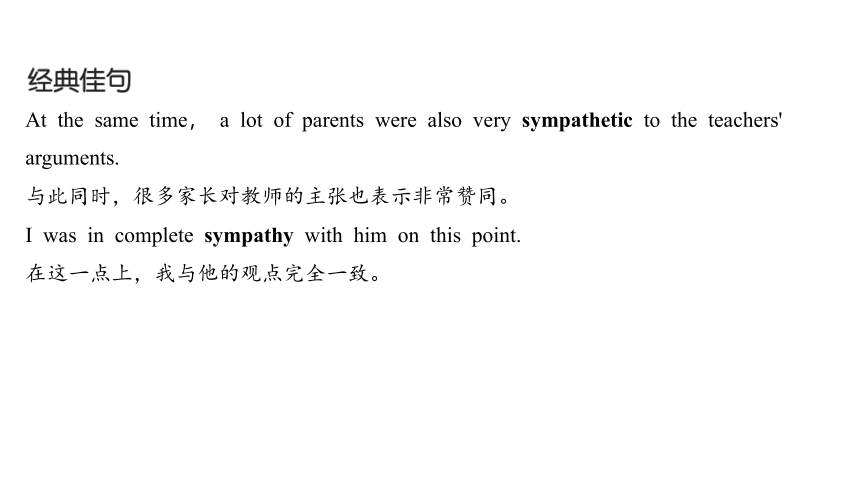
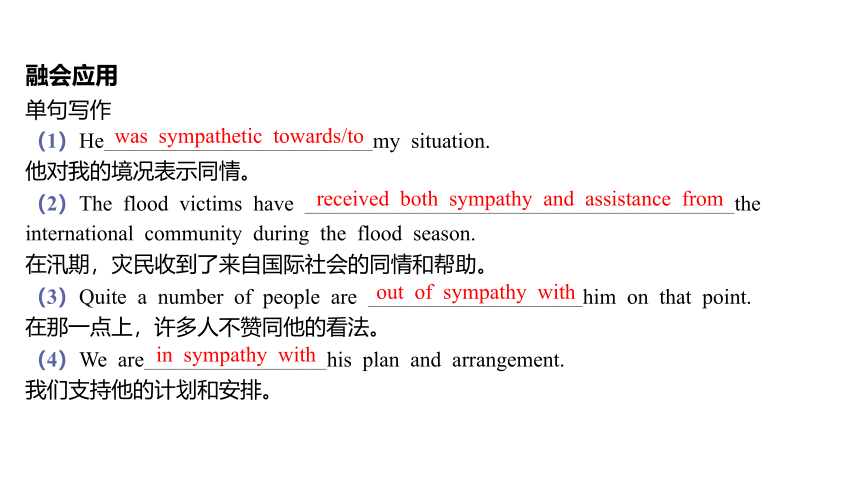
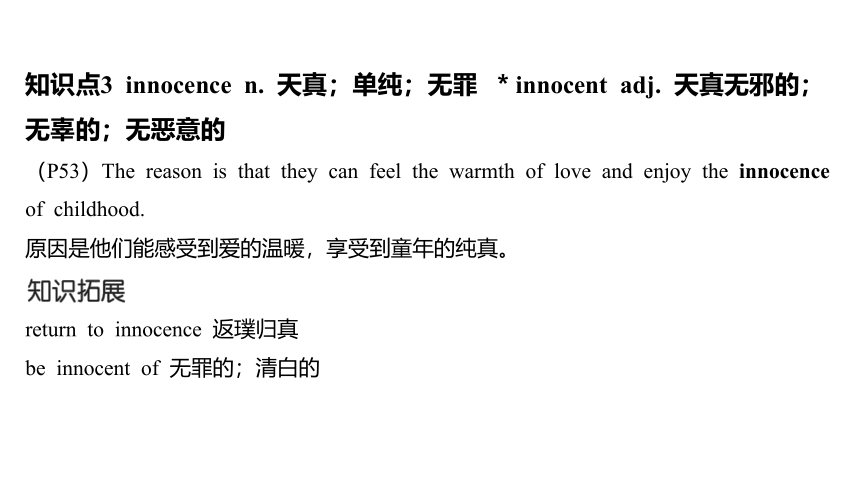
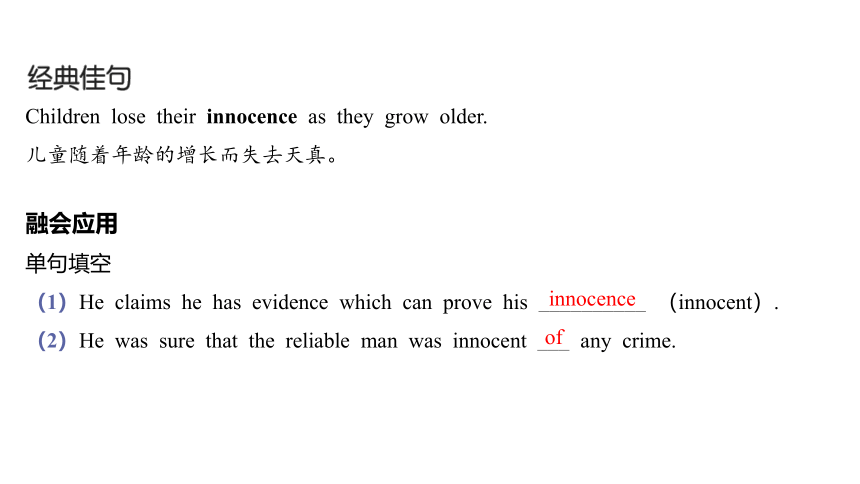
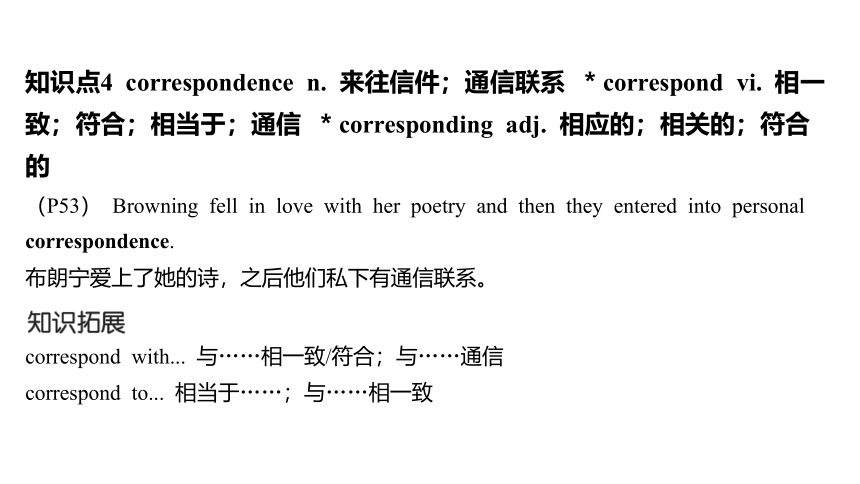
文档简介
(共43张PPT)
UNIT 5 POEMS
Section Ⅱ Learning About Language
1.通过对教材的理解,了解重要词汇的用法。(语言能力)
2.能够在语篇中正确理解和掌握定语从句的用法。(语言能力)
3.通过导学案的套用,以练促学,巩固内化定语从句的用法,并学以致用。(学习能力)
核 心 单 词
知识点1 blank adj. 空白的;无图画(或韵律、装饰)的;没表情的 n. 空白;空格 *blankly adv. 茫然地
(P52)Blank verse is probably one of the most common and influential forms of English poetry.
无韵诗可能是最常见和最有影响力的英语诗歌形式之一。
go blank (脑子里)突然一片空白;出现空白(指没有图像、文字等)
a blank look/expression 茫然的表情
look blank 茫然若失;一脸茫然
fill in the blank(s) 填空
Hearing the news,her mind went blank.
听到这个消息,她的大脑一片空白。
I am trying to think of his name,but my mind is a complete blank.
我在努力回想他的名字,但我怎么也想不起来。
融会应用
Ⅰ.单句填空
(1)I stared ________ (blank) at the paper in front of me.
blankly
(2)Use the information to fill in the _______ (blank) on your form.
blanks
(3)Steve looked ______ (blank) and said he had no idea what I was talking
about.
blank
Ⅱ.单句写作
(4)Before getting into the car,I thought I had learned the instructor's orders,but
once I started the car,____________________.
上车前,我以为我已经学会了教练的命令,但我一启动汽车,我的脑子就一片空白。
my mind went blank
(5)She stared at me __________________________
on her face.
她茫然地看着我。
with a blank look/expression
知识点2 sympathetic adj. 同情的;有同情心的;赞同的 *sympathy n. 同情;赞同 *sympathetically adv. 同情地;怜悯地
(P53)In these poems the poet Tagore shows a sympathetic understanding of children's feelings.
在这些诗中,诗人泰戈尔展示了对儿童情感的同理心。
be sympathetic to/towards... 对……表示同情;赞同……
feel sympathy for sb 对某人感到同情
in sympathy with... 支持……;赞同……;和……一致
out of sympathy with... 不赞同……;和……不一致
At the same time, a lot of parents were also very sympathetic to the teachers' arguments.
与此同时,很多家长对教师的主张也表示非常赞同。
I was in complete sympathy with him on this point.
在这一点上,我与他的观点完全一致。
融会应用
单句写作
(1)He_________________________my situation.
他对我的境况表示同情。
was sympathetic towards/to
(2)The flood victims have ________________________________________the
international community during the flood season.
在汛期,灾民收到了来自国际社会的同情和帮助。
received both sympathy and assistance from
(3)Quite a number of people are ____________________him on that point.
在那一点上,许多人不赞同他的看法。
out of sympathy with
(4)We are_________________his plan and arrangement.
我们支持他的计划和安排。
in sympathy with
知识点3 innocence n. 天真;单纯;无罪 *innocent adj. 天真无邪的;无辜的;无恶意的
(P53)The reason is that they can feel the warmth of love and enjoy the innocence of childhood.
原因是他们能感受到爱的温暖,享受到童年的纯真。
return to innocence 返璞归真
be innocent of 无罪的;清白的
Children lose their innocence as they grow older.
儿童随着年龄的增长而失去天真。
融会应用
单句填空
(1)He claims he has evidence which can prove his __________ (innocent).
innocence
(2)He was sure that the reliable man was innocent ___ any crime.
of
知识点4 correspondence n. 来往信件;通信联系 *correspond vi. 相一致;符合;相当于;通信 *corresponding adj. 相应的;相关的;符合的
(P53) Browning fell in love with her poetry and then they entered into personal correspondence.
布朗宁爱上了她的诗,之后他们私下有通信联系。
correspond with... 与……相一致/符合;与……通信
correspond to... 相当于……;与……相一致
Any correspondence or information might help us.
任何来往信件或信息都可能帮助我们。
Thanks to e-mail, they had been corresponding with each other through their computers.
多亏了电子邮件,他们一直通过电脑相互通信。
融会应用
单句填空
(1)Do you still correspond _____your penfriend?
with
(2)The Congress (国会) in the US corresponds ___the Parliament(议会) in
the UK.
to
(3)Let your actions correspond _______your words.
with/to
定 语 从 句
自主探究
阅读下列句子,注意黑体部分的用法。
1.She is the girl who lives next door.
2.She is the student whose handwriting is the best in the class.
3.I bought many books, where I spent all my money.
4.Sometimes there were gunfights,like the one in which Jiesang Suonandajie was killed.
我的发现(1) 句1、句2和句4为________定语从句,关系词分别在句中作______、
______和______。
限制性
主语
定语
宾语
(2)句3为__________定语从句,关系词在句中作______。
非限制性
状语
(3)句3中的关系词为where,可以转换为__________。
on which
探究点1 引导定语从句的关系词
在复合句中,修饰某一名词或代词的从句叫作定语从句,被修饰的名词或代词为先行词,定语从句一般放在先行词的后面,由关系词引导。
关系词 指代对象 在从句中所作成分
关系代词 who 指人 主语、宾语
whom 指人 宾语
which 指物 主语、宾语、表语
that 既指人又指物 主语、宾语、表语
whose 既指人又指物 定语
as 既指人又指物 主语、宾语、表语
关系词 指代对象 在从句中所作成分
关系 副词 when 指时间 时间状语
where 指地点 地点状语
why 指原因 原因状语
续表
1.关系代词
引导定语从句的关系代词有三个作用:
连接作用:引导从句,连接主句和从句;
替代作用:在从句中替代被从句所修饰的先行词;
在从句中充当成分:作主语、宾语、表语和定语。
●who, whom, that
它们所代替的先行词可以是指人的名词或代词,在从句中可作主语、宾语和表语。
Is he the man who/that wants to see you?(who/that在从句中作主语)
他就是想见你的那个人吗?
The author who/whom/that you criticized in your review has written a reply.(who/whom/that在从句中作宾语)
你在评论中批评的那位作者已经回信答复了。
She was not the beautiful woman that she was before she married.(that在从句中作表语)
她已经不是结婚前的那个漂亮女人了。
●whose
whose 用来指人或物,用作名词的限定语;若指物,它还可以同of which互换。
They rushed over to help the man whose car had broken down.
他们都跑过去帮助那个人,那个人的车坏了。
●which, that
它们所代替的先行词可以是指事物的名词或代词,在从句中可作主语、宾语。Prosperity which/that has never been seen before appears in the countryside.(which/that在从句中作主语)
农村出现了前所未有的繁荣。
The package which/that you are carrying is about to come unwrapped.(which/that在从句中作宾语)
你拿着的包裹快要散了。
注意:作宾语时关系代词常常可省略,而作主语时则不能省略。
2.关系副词
关系副词在定语从句中的基本用法:when作时间状语, where作地点状语, why作原因状语。此时, 关系副词一般可转化为“介词+which”的形式。
Many websites will say, at the bottom of the page, the date when (=at which) they were last updated.
许多网站会在页面的底端显示他们最后更新的日期。
A friend recently asked me what it's like to live in the city where (=in which) I grew up.
最近一个朋友问我,生活在从小长大的城市有何感受。
The reason why (=for which) I went to the train station was to meet my friend.
我去火车站的原因是去见我的朋友。
1.当先行词为表示时间、地点、原因的名词时, 若它们在定语从句中不作状语, 而作主语或宾语时, 就要用关系代词which/that来引导定语从句。
The museum which/that he visited has a long history.(先行词the museum 作动词visited的宾语)
他参观的那个博物馆有着悠久的历史。
I will never forget the days that/which I spent with my family.(先行词the days 作动词spent的宾语)
我永远也不会忘记与我的家人一起度过的日子。
2.含有介词的动词短语一般不拆开, 介词仍放在动词的后面。
The machine which I have looked after for twenty years is still working very well.
我照看了二十年的那台机器仍然运转得很好。
3.有时可以在when/where前加介词from、to等。
China is the birthplace of kites, from where kite flying spread around the world.
中国是风筝的发源地, 放风筝这个活动从那里流传到世界各地。
4.当先行词是case、condition、situation、position、point、stage等表示抽象意义的名词且在从句中作状语时用关系副词where引导定语从句。
They have reached the point where they have to separate from each other.
他们已经到了必须分开的地步。
5.that和which可以互换,但在下列情况下只用that:
●当先行词是不定代词all、little、few、much、none、anything、nothing、everything等时
Is there anything that I can do for you?
我能为你做些什么吗?
●当先行词被all、only、little、much、some、any、no、every等修饰时
The only thing that I can do is (to) wait.
我唯一能做的就是等待。
●当先行词被形容词最高级、序数词以及the very、the only 修饰时
This is the best film that I have ever seen.
这是我看过的最好的电影。
The first place that they visited in London was Big Ben.
他们在伦敦参观的第一个地方是大本钟。
This is the very dictionary that I want to buy.
这正是我要买的词典。
●当先行词同时包含人和物时
He talked about the teachers and schools that he had visited.
他谈论了他参观过的学校和拜访过的老师。
●当主句是以who或which 引导的特殊疑问句时
Who is the man that is talking to Mark?
与马克谈话的那个人是谁?
融会应用
用适当的关系词填空
(1)The teachers are discussing the plan __________ they would like to see carried
out next year.
that/which
(2)The Chinese restaurant on Baker Street, _______ used to be poorly run, is now
a successful business.
which
(3)There was a big change in the late 1970s in China, ______ people began
leaving China for study and work.
when
探究点2 “介词+关系代词 which/whom” 引导的定语从句
●介词+which/whom
This is the famous writer about whom we have often talked.
这就是我们经常谈论的那位著名作家。
Humor was a means by which the American writer would win popular acceptance.
幽默是美国作家赢得公众认可的一种手段。
●the+名词+of+which/whom(=whose+名词)
Please pass me the book, the cover of which (=whose cover) is blue.
请把那本蓝色封面的书递给我。
He caught sight of a small, single-story house, the window of which (=whose window) was lit up.
他看见一所小平房的窗户里有灯光。
●数词+of+which/whom
In our school, there are about 200 teachers, 30% of whom are women.
我们学校大约有200位教师, 其中30%是女性。
She has three storybooks, two of which are in English.
她有三本故事书, 其中两本是英文版的。
●代词+of+which/whom
In the basket I find many apples, some of which (=of which some) have gone bad.
我发现篮子里有好多苹果, 有些已经坏了。
There are fifty students in our class, most of whom are from big cities.
我们班有50名学生, 其中大多数来自大城市。
●形容词最高级+of+which/whom
China has thousands of islands, the largest of which is Taiwan.
中国有数千座岛屿, 其中最大的是台湾岛。
“介词+关系代词”结构中介词的选择可以总结为“一先、二动、三意义、四特殊”。
一先,即先看先行词,从先行词入手。介词往往和先行词构成固定搭配,如时间常和on、in、 by搭配,地点常和on、in、at搭配,原因常和for搭配,方式常和in、by、with搭配等。
This is the house in which (where) the inventor lived.
这就是那位发明家住过的房子。
二动,即看从句中的谓语动词。根据从句中谓语动词的搭配选择合适的介词。
He is the person of whom everyone has heard.
他是那位所有人都听说过的人。
三意义,即通过判断主句表达的全部意义来确定合适的介词。
He was educated at a local high school,after which he went on to Peking University.
他在当地的一所高中上学,之后他继续去北京大学学习。
四特殊:介词of 常用于“表示部分的词+of+关系代词”结构。
常见的表示部分的词:不定代词all、both、none、neither、either、some、any,数词(含基数词、序数词、分数和百分数),数词+名词,the+最高级/比较级,表示数目或数量的词(many、most、few、several、enough、half、a quarter)等。
There are 40 students in the classroom,some of whom are reading.
教室里有40名学生,有一些学生正在阅读。
融会应用
用适当的介词填空
(1)This is the book ____ which I paid 10 yuan.
for
(2)Jordan made a film ___ which he acted as a cartoon character.
in
(3)What is the youngest age ___ which a person can be employed
at
(4)I made a list of the members ______ whom I had received replies.
from
探究点3 限制性定语从句和非限制性定语从句
限制性定语从句 非限制性定语从句
和先行词的关系密切(删除后影响整个 句子意义的表达) 和先行词的关系不密切(起补充说明的作
用,删掉后不影响整个句子意义的表达)
不用逗号隔开 一般用逗号隔开
可用that引导 不可以用that引导
只可以修饰先行词,不可以修饰主句或 主句中的一部分 既可以修饰先行词,也可以修饰主句或主句
中的一部分
He is the man who came to see you yesterday.他是昨天来看你的那个人。
The sports meeting was put off,which astonished us.运动会推迟了,这让我们很吃惊。
as与which引导非限制性定语从句的区别:
as 引导非限制性定语从句时,修饰整个句子。
位置较灵活,可置于主句前、句中或句末;先行词不可是一个词,必须是整
个主句或主句的部分内容,一般意思是“正如;就像”
which 引导非限制性定语从句时,修饰整个句子,也可修饰先行词。
只能置于主句之后;先行词既可是一个词,也可是整个主句或主句的部分内
容;先行词是整个主句时,从句谓语动词用第三人称单数
As we all know,smoking is harmful to our health.众所周知,吸烟有害健康。
He finished the task ahead of time,which is very important to us.
他提前完成了任务,这对我们很重要。
融会应用
用适当的关系代词填空
(1)My eldest son, _______ work takes him all over the world, is in New York at
the moment.
whose
(2)Julie is good at German, French and Russian, all of _______ she speaks
fluently.
which
(3)Women _________ drink more than two cups of coffee a day have a greater
chance of having heart disease than those _____ don't.
who/that
who
(4)____ is mentioned above, the number of students in senior high schools is
increasing.
As
(5)Mr Li is an English teacher with much knowledge,from _______ much can be
learned.
whom
(6)The book tells stories of the earthquake through the eyes of those _______
lives were affected.
whose
(7)The mountain, _______ name means “flowers and fruit”, attracts millions of
tourists every year thanks to its mythical character and beautiful scenery.
whose
Ⅰ.单句填空
1.The boys _________are playing basketball are from Class Two.
who/that
2.The classroom_______door is broken will soon be repaired.
whose
3.He has a friend_______father is a teacher.
whose
4.All _____can be done has been done.
that
5.Beijing is the place _______I was born.
where
6.Is this the reason _____he refused our offer?
why
7.This is the house __________we bought last month.
which/that
8.Great changes have taken place in the city _______ I once studied.
where
9.He is the only person _____I want to talk to.
that
10.They talked about things and people _____they remembered from school.
that
Ⅱ.单句写作
1.We have entered into an age__________________________________________.
我们已经进入一个梦想有机会成真的时代。
where dreams have the chance of coming true
2.On the edge of the jacket, there is a piece of
cloth__________________________________.
在夹克的边缘上有一块在黑暗中会发光的布。
that/which gives off light in the dark
3.This is ______________________________________________________.
这是我读过的最有趣的书之一。
one of the most interesting books (that) I have ever read
4.Many young people,_______________________________, headed for remote
regions to chase their dreams.
很多年轻人都去了偏远地区追求自己的梦想, 他们中的大部分人都接受过良好的教育。
most of whom were well-educated
5.The number of smokers,_____________, has dropped by 17 percent in just one
year.
据报道, 吸烟的人数仅在一年内就已经减少了17%。
as is reported
6.The books on the desk,_________________________________________, are
prizes for us.
桌面上那些封面闪闪发亮的书是我们的奖品。
whose covers/the covers of which are shining
Ⅲ.用适当的关系代词或关系副词完成短文
It was the summer of 2019, 1.______ I came to Guangning No.1 Senior High
School. Our school is a wonderful place,2._______ I can see a lot of beautiful
buildings and a large square. Our teaching building, the roof of 3._______ looks
like a rocket in the distance, is located in the center of our school. The main
reason 4._____ I like our school is that I can make many friends. I can get along
well with my classmates here, two of 5._______ are my best friends. Jack,6._____
comes from Tanbu Junior High School, is very active. He likes various sports,
among 7._______ he likes running best. He runs five kilometers every day,
when
where
which
why
whom
who
which
8._______ makes him strong. Nick, 9._______ father is a teacher in Lianhe Junior
High School, studies very hard. We often talk about the people and things 10._____
we see in our school. Nick prefers the food 11.__________ is made in our canteen.
The teacher 12.______________ he likes is Mr Zhang,our math teacher.
which
whose
that
that/which
that/whom/who
UNIT 5 POEMS
Section Ⅱ Learning About Language
1.通过对教材的理解,了解重要词汇的用法。(语言能力)
2.能够在语篇中正确理解和掌握定语从句的用法。(语言能力)
3.通过导学案的套用,以练促学,巩固内化定语从句的用法,并学以致用。(学习能力)
核 心 单 词
知识点1 blank adj. 空白的;无图画(或韵律、装饰)的;没表情的 n. 空白;空格 *blankly adv. 茫然地
(P52)Blank verse is probably one of the most common and influential forms of English poetry.
无韵诗可能是最常见和最有影响力的英语诗歌形式之一。
go blank (脑子里)突然一片空白;出现空白(指没有图像、文字等)
a blank look/expression 茫然的表情
look blank 茫然若失;一脸茫然
fill in the blank(s) 填空
Hearing the news,her mind went blank.
听到这个消息,她的大脑一片空白。
I am trying to think of his name,but my mind is a complete blank.
我在努力回想他的名字,但我怎么也想不起来。
融会应用
Ⅰ.单句填空
(1)I stared ________ (blank) at the paper in front of me.
blankly
(2)Use the information to fill in the _______ (blank) on your form.
blanks
(3)Steve looked ______ (blank) and said he had no idea what I was talking
about.
blank
Ⅱ.单句写作
(4)Before getting into the car,I thought I had learned the instructor's orders,but
once I started the car,____________________.
上车前,我以为我已经学会了教练的命令,但我一启动汽车,我的脑子就一片空白。
my mind went blank
(5)She stared at me __________________________
on her face.
她茫然地看着我。
with a blank look/expression
知识点2 sympathetic adj. 同情的;有同情心的;赞同的 *sympathy n. 同情;赞同 *sympathetically adv. 同情地;怜悯地
(P53)In these poems the poet Tagore shows a sympathetic understanding of children's feelings.
在这些诗中,诗人泰戈尔展示了对儿童情感的同理心。
be sympathetic to/towards... 对……表示同情;赞同……
feel sympathy for sb 对某人感到同情
in sympathy with... 支持……;赞同……;和……一致
out of sympathy with... 不赞同……;和……不一致
At the same time, a lot of parents were also very sympathetic to the teachers' arguments.
与此同时,很多家长对教师的主张也表示非常赞同。
I was in complete sympathy with him on this point.
在这一点上,我与他的观点完全一致。
融会应用
单句写作
(1)He_________________________my situation.
他对我的境况表示同情。
was sympathetic towards/to
(2)The flood victims have ________________________________________the
international community during the flood season.
在汛期,灾民收到了来自国际社会的同情和帮助。
received both sympathy and assistance from
(3)Quite a number of people are ____________________him on that point.
在那一点上,许多人不赞同他的看法。
out of sympathy with
(4)We are_________________his plan and arrangement.
我们支持他的计划和安排。
in sympathy with
知识点3 innocence n. 天真;单纯;无罪 *innocent adj. 天真无邪的;无辜的;无恶意的
(P53)The reason is that they can feel the warmth of love and enjoy the innocence of childhood.
原因是他们能感受到爱的温暖,享受到童年的纯真。
return to innocence 返璞归真
be innocent of 无罪的;清白的
Children lose their innocence as they grow older.
儿童随着年龄的增长而失去天真。
融会应用
单句填空
(1)He claims he has evidence which can prove his __________ (innocent).
innocence
(2)He was sure that the reliable man was innocent ___ any crime.
of
知识点4 correspondence n. 来往信件;通信联系 *correspond vi. 相一致;符合;相当于;通信 *corresponding adj. 相应的;相关的;符合的
(P53) Browning fell in love with her poetry and then they entered into personal correspondence.
布朗宁爱上了她的诗,之后他们私下有通信联系。
correspond with... 与……相一致/符合;与……通信
correspond to... 相当于……;与……相一致
Any correspondence or information might help us.
任何来往信件或信息都可能帮助我们。
Thanks to e-mail, they had been corresponding with each other through their computers.
多亏了电子邮件,他们一直通过电脑相互通信。
融会应用
单句填空
(1)Do you still correspond _____your penfriend?
with
(2)The Congress (国会) in the US corresponds ___the Parliament(议会) in
the UK.
to
(3)Let your actions correspond _______your words.
with/to
定 语 从 句
自主探究
阅读下列句子,注意黑体部分的用法。
1.She is the girl who lives next door.
2.She is the student whose handwriting is the best in the class.
3.I bought many books, where I spent all my money.
4.Sometimes there were gunfights,like the one in which Jiesang Suonandajie was killed.
我的发现(1) 句1、句2和句4为________定语从句,关系词分别在句中作______、
______和______。
限制性
主语
定语
宾语
(2)句3为__________定语从句,关系词在句中作______。
非限制性
状语
(3)句3中的关系词为where,可以转换为__________。
on which
探究点1 引导定语从句的关系词
在复合句中,修饰某一名词或代词的从句叫作定语从句,被修饰的名词或代词为先行词,定语从句一般放在先行词的后面,由关系词引导。
关系词 指代对象 在从句中所作成分
关系代词 who 指人 主语、宾语
whom 指人 宾语
which 指物 主语、宾语、表语
that 既指人又指物 主语、宾语、表语
whose 既指人又指物 定语
as 既指人又指物 主语、宾语、表语
关系词 指代对象 在从句中所作成分
关系 副词 when 指时间 时间状语
where 指地点 地点状语
why 指原因 原因状语
续表
1.关系代词
引导定语从句的关系代词有三个作用:
连接作用:引导从句,连接主句和从句;
替代作用:在从句中替代被从句所修饰的先行词;
在从句中充当成分:作主语、宾语、表语和定语。
●who, whom, that
它们所代替的先行词可以是指人的名词或代词,在从句中可作主语、宾语和表语。
Is he the man who/that wants to see you?(who/that在从句中作主语)
他就是想见你的那个人吗?
The author who/whom/that you criticized in your review has written a reply.(who/whom/that在从句中作宾语)
你在评论中批评的那位作者已经回信答复了。
She was not the beautiful woman that she was before she married.(that在从句中作表语)
她已经不是结婚前的那个漂亮女人了。
●whose
whose 用来指人或物,用作名词的限定语;若指物,它还可以同of which互换。
They rushed over to help the man whose car had broken down.
他们都跑过去帮助那个人,那个人的车坏了。
●which, that
它们所代替的先行词可以是指事物的名词或代词,在从句中可作主语、宾语。Prosperity which/that has never been seen before appears in the countryside.(which/that在从句中作主语)
农村出现了前所未有的繁荣。
The package which/that you are carrying is about to come unwrapped.(which/that在从句中作宾语)
你拿着的包裹快要散了。
注意:作宾语时关系代词常常可省略,而作主语时则不能省略。
2.关系副词
关系副词在定语从句中的基本用法:when作时间状语, where作地点状语, why作原因状语。此时, 关系副词一般可转化为“介词+which”的形式。
Many websites will say, at the bottom of the page, the date when (=at which) they were last updated.
许多网站会在页面的底端显示他们最后更新的日期。
A friend recently asked me what it's like to live in the city where (=in which) I grew up.
最近一个朋友问我,生活在从小长大的城市有何感受。
The reason why (=for which) I went to the train station was to meet my friend.
我去火车站的原因是去见我的朋友。
1.当先行词为表示时间、地点、原因的名词时, 若它们在定语从句中不作状语, 而作主语或宾语时, 就要用关系代词which/that来引导定语从句。
The museum which/that he visited has a long history.(先行词the museum 作动词visited的宾语)
他参观的那个博物馆有着悠久的历史。
I will never forget the days that/which I spent with my family.(先行词the days 作动词spent的宾语)
我永远也不会忘记与我的家人一起度过的日子。
2.含有介词的动词短语一般不拆开, 介词仍放在动词的后面。
The machine which I have looked after for twenty years is still working very well.
我照看了二十年的那台机器仍然运转得很好。
3.有时可以在when/where前加介词from、to等。
China is the birthplace of kites, from where kite flying spread around the world.
中国是风筝的发源地, 放风筝这个活动从那里流传到世界各地。
4.当先行词是case、condition、situation、position、point、stage等表示抽象意义的名词且在从句中作状语时用关系副词where引导定语从句。
They have reached the point where they have to separate from each other.
他们已经到了必须分开的地步。
5.that和which可以互换,但在下列情况下只用that:
●当先行词是不定代词all、little、few、much、none、anything、nothing、everything等时
Is there anything that I can do for you?
我能为你做些什么吗?
●当先行词被all、only、little、much、some、any、no、every等修饰时
The only thing that I can do is (to) wait.
我唯一能做的就是等待。
●当先行词被形容词最高级、序数词以及the very、the only 修饰时
This is the best film that I have ever seen.
这是我看过的最好的电影。
The first place that they visited in London was Big Ben.
他们在伦敦参观的第一个地方是大本钟。
This is the very dictionary that I want to buy.
这正是我要买的词典。
●当先行词同时包含人和物时
He talked about the teachers and schools that he had visited.
他谈论了他参观过的学校和拜访过的老师。
●当主句是以who或which 引导的特殊疑问句时
Who is the man that is talking to Mark?
与马克谈话的那个人是谁?
融会应用
用适当的关系词填空
(1)The teachers are discussing the plan __________ they would like to see carried
out next year.
that/which
(2)The Chinese restaurant on Baker Street, _______ used to be poorly run, is now
a successful business.
which
(3)There was a big change in the late 1970s in China, ______ people began
leaving China for study and work.
when
探究点2 “介词+关系代词 which/whom” 引导的定语从句
●介词+which/whom
This is the famous writer about whom we have often talked.
这就是我们经常谈论的那位著名作家。
Humor was a means by which the American writer would win popular acceptance.
幽默是美国作家赢得公众认可的一种手段。
●the+名词+of+which/whom(=whose+名词)
Please pass me the book, the cover of which (=whose cover) is blue.
请把那本蓝色封面的书递给我。
He caught sight of a small, single-story house, the window of which (=whose window) was lit up.
他看见一所小平房的窗户里有灯光。
●数词+of+which/whom
In our school, there are about 200 teachers, 30% of whom are women.
我们学校大约有200位教师, 其中30%是女性。
She has three storybooks, two of which are in English.
她有三本故事书, 其中两本是英文版的。
●代词+of+which/whom
In the basket I find many apples, some of which (=of which some) have gone bad.
我发现篮子里有好多苹果, 有些已经坏了。
There are fifty students in our class, most of whom are from big cities.
我们班有50名学生, 其中大多数来自大城市。
●形容词最高级+of+which/whom
China has thousands of islands, the largest of which is Taiwan.
中国有数千座岛屿, 其中最大的是台湾岛。
“介词+关系代词”结构中介词的选择可以总结为“一先、二动、三意义、四特殊”。
一先,即先看先行词,从先行词入手。介词往往和先行词构成固定搭配,如时间常和on、in、 by搭配,地点常和on、in、at搭配,原因常和for搭配,方式常和in、by、with搭配等。
This is the house in which (where) the inventor lived.
这就是那位发明家住过的房子。
二动,即看从句中的谓语动词。根据从句中谓语动词的搭配选择合适的介词。
He is the person of whom everyone has heard.
他是那位所有人都听说过的人。
三意义,即通过判断主句表达的全部意义来确定合适的介词。
He was educated at a local high school,after which he went on to Peking University.
他在当地的一所高中上学,之后他继续去北京大学学习。
四特殊:介词of 常用于“表示部分的词+of+关系代词”结构。
常见的表示部分的词:不定代词all、both、none、neither、either、some、any,数词(含基数词、序数词、分数和百分数),数词+名词,the+最高级/比较级,表示数目或数量的词(many、most、few、several、enough、half、a quarter)等。
There are 40 students in the classroom,some of whom are reading.
教室里有40名学生,有一些学生正在阅读。
融会应用
用适当的介词填空
(1)This is the book ____ which I paid 10 yuan.
for
(2)Jordan made a film ___ which he acted as a cartoon character.
in
(3)What is the youngest age ___ which a person can be employed
at
(4)I made a list of the members ______ whom I had received replies.
from
探究点3 限制性定语从句和非限制性定语从句
限制性定语从句 非限制性定语从句
和先行词的关系密切(删除后影响整个 句子意义的表达) 和先行词的关系不密切(起补充说明的作
用,删掉后不影响整个句子意义的表达)
不用逗号隔开 一般用逗号隔开
可用that引导 不可以用that引导
只可以修饰先行词,不可以修饰主句或 主句中的一部分 既可以修饰先行词,也可以修饰主句或主句
中的一部分
He is the man who came to see you yesterday.他是昨天来看你的那个人。
The sports meeting was put off,which astonished us.运动会推迟了,这让我们很吃惊。
as与which引导非限制性定语从句的区别:
as 引导非限制性定语从句时,修饰整个句子。
位置较灵活,可置于主句前、句中或句末;先行词不可是一个词,必须是整
个主句或主句的部分内容,一般意思是“正如;就像”
which 引导非限制性定语从句时,修饰整个句子,也可修饰先行词。
只能置于主句之后;先行词既可是一个词,也可是整个主句或主句的部分内
容;先行词是整个主句时,从句谓语动词用第三人称单数
As we all know,smoking is harmful to our health.众所周知,吸烟有害健康。
He finished the task ahead of time,which is very important to us.
他提前完成了任务,这对我们很重要。
融会应用
用适当的关系代词填空
(1)My eldest son, _______ work takes him all over the world, is in New York at
the moment.
whose
(2)Julie is good at German, French and Russian, all of _______ she speaks
fluently.
which
(3)Women _________ drink more than two cups of coffee a day have a greater
chance of having heart disease than those _____ don't.
who/that
who
(4)____ is mentioned above, the number of students in senior high schools is
increasing.
As
(5)Mr Li is an English teacher with much knowledge,from _______ much can be
learned.
whom
(6)The book tells stories of the earthquake through the eyes of those _______
lives were affected.
whose
(7)The mountain, _______ name means “flowers and fruit”, attracts millions of
tourists every year thanks to its mythical character and beautiful scenery.
whose
Ⅰ.单句填空
1.The boys _________are playing basketball are from Class Two.
who/that
2.The classroom_______door is broken will soon be repaired.
whose
3.He has a friend_______father is a teacher.
whose
4.All _____can be done has been done.
that
5.Beijing is the place _______I was born.
where
6.Is this the reason _____he refused our offer?
why
7.This is the house __________we bought last month.
which/that
8.Great changes have taken place in the city _______ I once studied.
where
9.He is the only person _____I want to talk to.
that
10.They talked about things and people _____they remembered from school.
that
Ⅱ.单句写作
1.We have entered into an age__________________________________________.
我们已经进入一个梦想有机会成真的时代。
where dreams have the chance of coming true
2.On the edge of the jacket, there is a piece of
cloth__________________________________.
在夹克的边缘上有一块在黑暗中会发光的布。
that/which gives off light in the dark
3.This is ______________________________________________________.
这是我读过的最有趣的书之一。
one of the most interesting books (that) I have ever read
4.Many young people,_______________________________, headed for remote
regions to chase their dreams.
很多年轻人都去了偏远地区追求自己的梦想, 他们中的大部分人都接受过良好的教育。
most of whom were well-educated
5.The number of smokers,_____________, has dropped by 17 percent in just one
year.
据报道, 吸烟的人数仅在一年内就已经减少了17%。
as is reported
6.The books on the desk,_________________________________________, are
prizes for us.
桌面上那些封面闪闪发亮的书是我们的奖品。
whose covers/the covers of which are shining
Ⅲ.用适当的关系代词或关系副词完成短文
It was the summer of 2019, 1.______ I came to Guangning No.1 Senior High
School. Our school is a wonderful place,2._______ I can see a lot of beautiful
buildings and a large square. Our teaching building, the roof of 3._______ looks
like a rocket in the distance, is located in the center of our school. The main
reason 4._____ I like our school is that I can make many friends. I can get along
well with my classmates here, two of 5._______ are my best friends. Jack,6._____
comes from Tanbu Junior High School, is very active. He likes various sports,
among 7._______ he likes running best. He runs five kilometers every day,
when
where
which
why
whom
who
which
8._______ makes him strong. Nick, 9._______ father is a teacher in Lianhe Junior
High School, studies very hard. We often talk about the people and things 10._____
we see in our school. Nick prefers the food 11.__________ is made in our canteen.
The teacher 12.______________ he likes is Mr Zhang,our math teacher.
which
whose
that
that/which
that/whom/who
